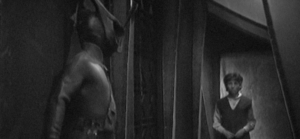 Then: The Doctor, in his first incarnation, prepares to steal a TARDIS and escape Gallifrey with his grandddaughter, Susan. In the TARDIS repair docks of Gallifrey, he is greeted not by security, but by a young woman whose face and name he will not know until his eleventh incarnation. She advises him to steal a different TARDIS than the one he was planning to take.
Then: The Doctor, in his first incarnation, prepares to steal a TARDIS and escape Gallifrey with his grandddaughter, Susan. In the TARDIS repair docks of Gallifrey, he is greeted not by security, but by a young woman whose face and name he will not know until his eleventh incarnation. She advises him to steal a different TARDIS than the one he was planning to take.
Now: The Doctor’s friends hold a cross between a teleconference and a seance, discussing an item of immediate concern: a man who claims to know the Doctor’s true name, his greatest secret. But the gathering itself is a trap: one by one, Jenny, Strax, and Madame Vastra are abducted and taken to Trenzalore, a planet where the Doctor has been predicted to fall. Clara relays this to the Doctor, and after a moment of hesitation, he leads the charge to free his allies. On Trenzalore, he is greeted by the unlikely sight of a giant TARDIS – his TARDIS, abandoned since his future death, its exterior dimensions catching up with its interior dimensions. As soon as the Doctor and Clara enter this future iteration of the TARDIS, it’s quite obvious that it’s a trap. At the heart of the TARDIS, the former console room, the Great Intelligence lurks with a small army of whisper men. The Intelligence wants to undo the Doctor’s history once and for all, by stepping into the Time Lord’s already-paradoxical time stream and thwarting every victory in the Doctor’s history. Against the Doctor’s wishes and his express warning about the danger involved, Clara leaps into the Doctor’s time stream in her own bid to defeat the Great Intelligence at every turn. In doing this, she is splintered into many incarnations of her own, meeting all of the Doctor’s faces and assisting all of them at some point in their adventures: this is why the Doctor has met more than one Clara, and why she has always seemed to go out of her way – even sacrificing her life – to save him. The Doctor jumps into his own time stream to retrieve her once the damage to his history is reversed, finding her alone with someone she doesn’t recognize as one of the Doctor’s many faces.
But the Doctor recognizes this face. It is the face which does not call itself the Doctor. It is the face of the man who fought the final battle of the Last Great Time War.
written by Steven Moffat
directed by Saul Metzstein
music by Murray GoldCast: Matt Smith (The Doctor), Jenna-Louise Coleman (Clara), Alex Kingston (River Song), Richard E. Grant (Dr. Simeon), Neve McIntosh (Vastra), Catrin Stewart (Jenny), Dan Starkey (Strax), Eve de Leon Allen (Angie), Kassius Carey Johnson (Artie), Nasi Voutsas (Andro), David Avery (Fabian), Michael Jenn (Clarence), Rab Affleck (Archie), Samuel Irvine (Messenger Boy), Sophie Downham (young Clara), Paul Kasey (Whisper Man), John Hurt (The Doctor), William Hartnell (The Doctor)
Notes: Via colorized B&W footage from the original series
(and stand-ins), William Hartnell has a speaking part in an episode of Doctor Who for the first time since the prologue of 1983’s The Five Doctors. The Five Doctors is also the source of film clips of Patrick Troughton and Jon Pertwee. Tom Baker appears in a clip from 1977’s The Invasion Of Time, while Peter Davison appears in footage from 1983’s Arc Of Infinity. A brief clip of Sylvester McCoy from Dragonfire (1987) is also seen; Colin Baker, Paul McGann and Christopher Eccleston are represented by stand-ins wearing their costumes rather than by film or video clips.
The Great Intelligence mentions some of the Doctor’s “other names”, including “the Oncoming Storm” (the Daleks’ name for the Doctor, first revealed in the novelization of 1988’s Remembrance Of The Daleks in its original Dalek translation, Ka Faraq Gatri) and the Valeyard from The Trial Of A Time Lord, an enigmatic “future aspect” of the Doctor which was, in his only appearance in 1986, said to fall somewhere “between the Doctor’s 12th and final regeneration”.
LogBook entry & review by Earl Green
Review: About the last thing I expected was for any episode this season, even the anniversary, to open with a scene 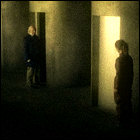 including William Hartnell. The Name Of The Doctor is a blatant Valentine to classic Doctor Who, from the visual nods to each of the classic series Doctors to continuity references that only a mother (or an unabashed longtime fan) could love – including the first mention of Valeyard breathed on television since The Trial Of A Time Lord (largely, one suspects, because none of the subsequent makers of the show have wanted to try to sort out the labyrinthine explanation of where, in the Doctor’s timeline, that character falls).
including William Hartnell. The Name Of The Doctor is a blatant Valentine to classic Doctor Who, from the visual nods to each of the classic series Doctors to continuity references that only a mother (or an unabashed longtime fan) could love – including the first mention of Valeyard breathed on television since The Trial Of A Time Lord (largely, one suspects, because none of the subsequent makers of the show have wanted to try to sort out the labyrinthine explanation of where, in the Doctor’s timeline, that character falls).
Then again, it’s not as if this episode doesn’t introduce its own wrinkles to rival the twisted origins of the Valeyard: the introduction of John Hurt as the-Doctor-and-yet-not-the-Doctor seemed to be almost tailor-made to 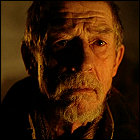 cause internet fandom to explode. One could almost be forgiven for forgetting that other stuff actually happened in this episode.
cause internet fandom to explode. One could almost be forgiven for forgetting that other stuff actually happened in this episode.
The new series once again seems to owe something to the “expanded universe” media that kept Doctor Who alive between television series. It’s difficult to avoid noting a basic structural similarity shared between The Name Of The Doctor and the early BBC Books eighth Doctor novel “Alien Bodies”, which also involves enemies of the Doctor vying to seize his remains as a valuable tactical asset to help them eliminate the Time Lord even earlier in his history than whatever death resulted in those remains in the first place. Ignoring the obvious paradox for a moment, it was – and is – a fascinating basic premise. (And the beauty of it is, the television episode deals with the Doctor’s “time stream” while the novel dealss with his physical remains, so this isn’t another Human Nature where  you have to bend over backwards to allow for both versions of the story to happen in the same universe or timeline.)
you have to bend over backwards to allow for both versions of the story to happen in the same universe or timeline.)
And, quite unlike some elements of the Moffat era I could name… I’m completely satisfied with the explanation of Clara, the impossible girl. It makes sense, as much as anything in Doctor Who possibly can, it doesn’t break the universe (or at least my conception of it in Who terms), and we might just have our first non-doomed Moffat-era companion. (River Song was a dead woman walking before we were even out of the Tennant era, and while Amy and Rory got to live out their lives to a certain extent, their exit was still a bit on the traumatic side.) That being said, however, Clara could still be doomed – both of the Claras we’ve met before (Asylum Of The Daleks, The Snowmen) have died tragically while saving the Doctor, and it’s perhaps not too difficult to make the logical leap that every iteration of Clara that we see glimpses of, helping the Doctor’s previous incarnations, also met with tragic ends. The question is: by entering his own time stream (whatever that really means) to retrieve her, has the Doctor broken the cycle, 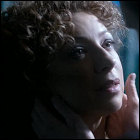 allowing the “original” Clara to live out her life? Or is this Clara fated to die at some future point when Jenna Coleman is ready to leave the show?
allowing the “original” Clara to live out her life? Or is this Clara fated to die at some future point when Jenna Coleman is ready to leave the show?
Speaking of River, her reappearance here is a shock, since it’s the first time we’ve glimpsed a version of river from after Forest Of The Dead. To put it mildly, this is a new lease of life for the character, provided it’s more sparingly deployed than the nearly-ubiquitous River of the Moffat/Smith-era’s early seasons. Used judiciously, this new twist on River could make things very interesting indeed.
There’s also the nagging question of whether this was the endgame of the Great Intelligence’s plan for revenge against the Doctor, or if it was a more typical foiled scheme along the lines of the Intelligence’s attempt to spread through the wireless internet in The Bells Of Saint Johns? (And he would’ve gotten away with it, too, if it wasn’t for those meddling Sontarans, Silurians, 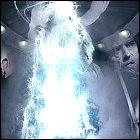 impossible girls, data ghosts of dead women, etc. …) Although it represents a fairly significant attempt to do away with the Time Lord, it’s altogether too easily thwarted – leaving the Doctor’s remaining allies alive and in a position to simply jump into the time stream themselves makes little sense from an evil-master-plan perspective; it conveniently leaves too much open to chance, though it suggests interesting things when Vastra and Clara were left intact despite the massive changes to the Doctor’s history, which by definition must include their own origin stories as well.
impossible girls, data ghosts of dead women, etc. …) Although it represents a fairly significant attempt to do away with the Time Lord, it’s altogether too easily thwarted – leaving the Doctor’s remaining allies alive and in a position to simply jump into the time stream themselves makes little sense from an evil-master-plan perspective; it conveniently leaves too much open to chance, though it suggests interesting things when Vastra and Clara were left intact despite the massive changes to the Doctor’s history, which by definition must include their own origin stories as well.
The Name Of The Doctor may end up asking more questions 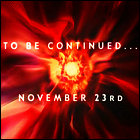 than it answers, particularly while it’s setting things up for the 50th anniversary, but it’s a better season finale than The Wedding Of River Song, at the very least, and its classic series callbacks satisfy the natural desire to see “old Doctors in the anniversary special.” By getting these kisses to the past out of the way now, one wonders what’s still to come for the anniversary itself.
than it answers, particularly while it’s setting things up for the 50th anniversary, but it’s a better season finale than The Wedding Of River Song, at the very least, and its classic series callbacks satisfy the natural desire to see “old Doctors in the anniversary special.” By getting these kisses to the past out of the way now, one wonders what’s still to come for the anniversary itself.

